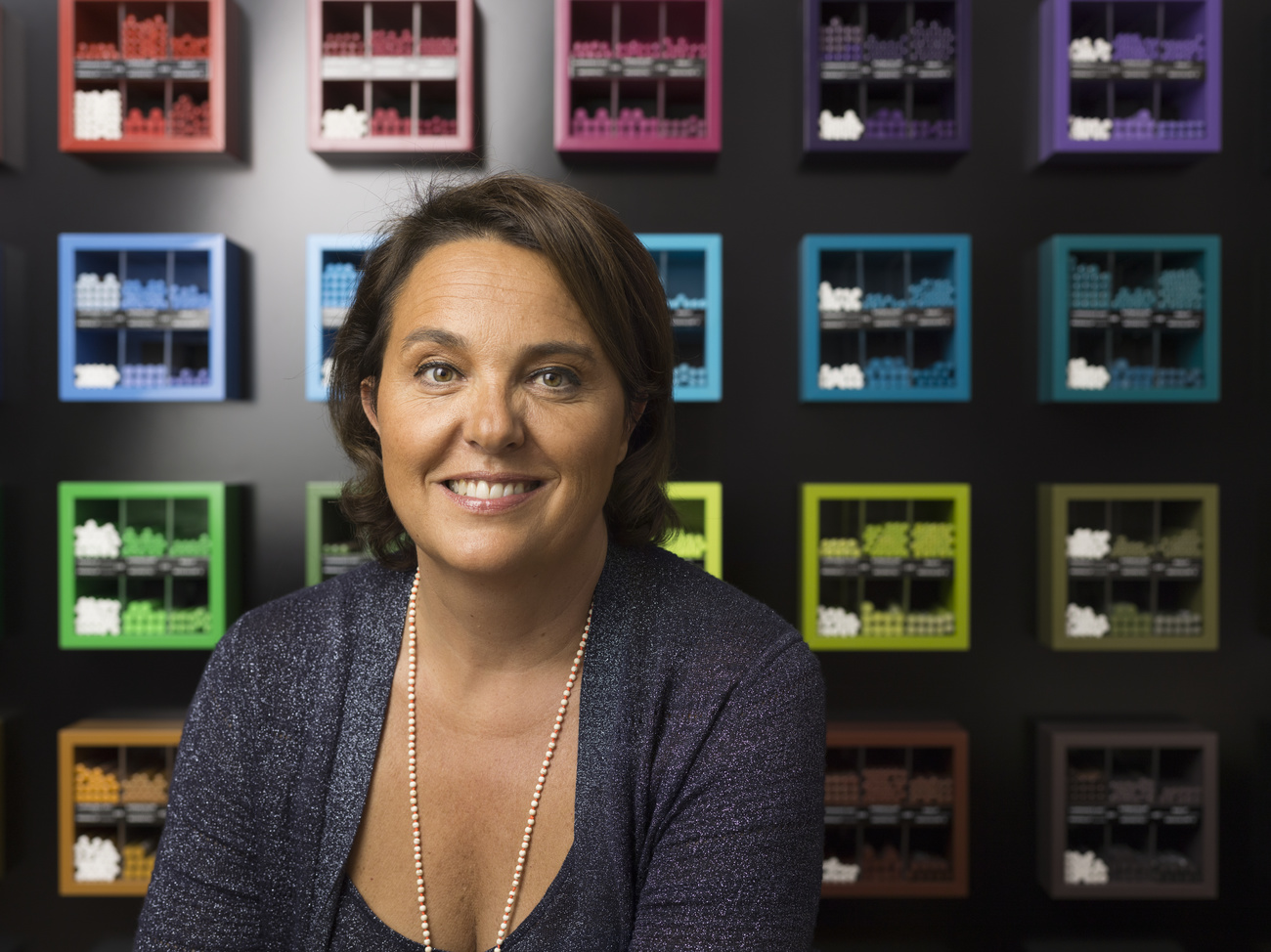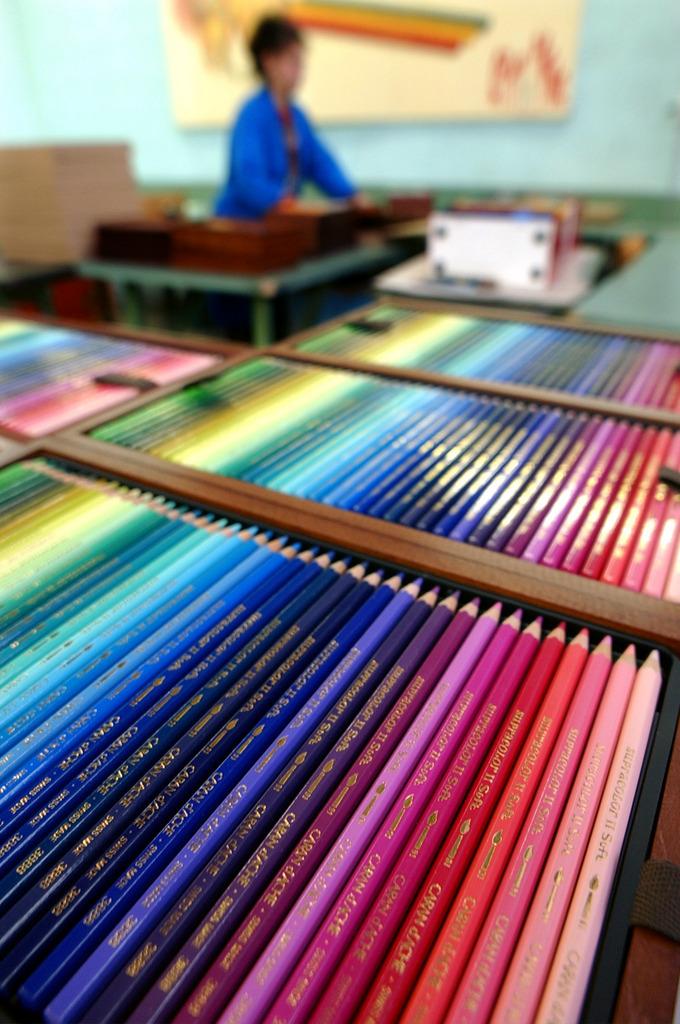Caran d’Ache CEO on the brand’s commitment to ‘Swiss Made’

Caran d’Ache, a Geneva-based manufacturer of drawing and writing instruments founded in 1915, sells its products in 90 countries. Its president, Carole Hubscher, wants the family-owned company to stay put in the Swiss city. But the drastic rise in energy costs has her worried.
SWI swissinfo.ch: What are some of the major developments that have happened at Caran d’Ache in the last ten years?
Carol Hubscher: First, we decided to unify our business under one logo and one brand, that being Caran d’Ache. It wasn’t an easy decision because the prices of our products range from two to several thousand Swiss francs. But as our position is one of excellence in all our product categories, we think the mono-brand strategy is appropriate.
Second, we have focused heavily on digitalisation. This includes the development of in-house tools as well as the deployment of e-commerce and our presence on social media.
SWI: What are you doing to improve brand recognition around the world?
C.H.: This is the third major development. Our philosophy is that everything we do should enrich our brand. In addition to producing excellent quality products, we have established various partnerships with designers, artists, architects, and more recently, with ambassadors. In doing this, we have chosen to work with specialists in our field rather than with well-known celebrities. This strength of our brand is also our best asset in the protection of our inventions.
SWI: How has your e-commerce and social media strategy developed?
C.H.: We started selling online in Switzerland in 2012 before expanding to Europe and, finally, to the United States and Japan. The pandemic has really boosted online sales and many of our external retail partners have recently opened online stores.
As for social media, we’re focusing on Instagram, Facebook and LinkedIn. It helps us to showcase our brand and to better understand the expectations of our consumers. We also offer online tutorials on YouTube.
SWI: Do you think demand for writing products will decline sharply in the era of digital and smartphones?
C.H.: One might think so, but the reality shows the opposite is true. The year 2021 was the second-best year in our history. Certainly, consumers are writing less than in the past, but our products allow them to develop their creativity, a quality which is more valued than ever.
Carole Hubscher joined the board of directors of Caran d’Ache in 2002. She was made president in 2012 and CEO in 2021.
Before that, Hubscher worked at Caran d’Ache’s American distributer in New York and at the Geneva headquarters. She has also worked for the Swatch Group, as a consultant for a branding agency, and was a partner in a business involved in designing premium and luxury brands.
Hubscher, a married mother of three, is a graduate of the Hotel Management School of Geneva and the Harvard Business School Program for Management Development.
SWI: But Caran d’Ache continues to be discrete about its financial results.
C.H.: Yes, because the figures only interest our competitors.
SWI: Your writing and drawing products have been manufactured in your workshops in Geneva since 1915. If you were to decentralise, would they still be considered Swiss-made?
C.H.: Some of our European competitors decided to move the majority of their factories to Indonesia or South America, keeping just a few small production units in their home country. Despite this, their products are arguably perceived as partially European.
That said, Caran d’Ache has decided not to move production abroad. The construction of our future manufacturing facility in Bernex, canton Geneva, is proof of this. In other words, we want to maintain the sincerity of our Swiss Made label, the authenticity of our brand and the confidence of our customers. And if we were to relocate, we would lose the considerable know-how of our employees, which has taken decades to build.
We’re also attached to certain key suppliers based in and near Switzerland. Of course, our strategic choice to produce in Switzerland increases our costs but we compensate for this disadvantage through our capacity to innovate.
SWI: Is Geneva’s workforce really more innovative than workers in other parts of the world?
C.H.: In Switzerland, not only do we have excellent universities but we also have universities of applied sciences and quality apprenticeships. The combination of these different types of training is a big plus for creating highly innovative teams. In our business, we emphasise continued innovation, such as in the manufacturing process, rather disruptive innovations. .
SWI: There is a myriad of watchmakers in the world but only a handful of players in your sector. How do you explain it?
C.H.: Manufacturing pencils may seem very simple, but the reality is infinitely more complex because it requires unique skills and very substantial production tools. It takes more than 35 steps to produce a colour pencil, and this goes up to 50 to make a graphite pencil. So the barriers to entry into our industry are considerable, especially because the number of suppliers is very limited. We are the only manufacturer in the world to have mastered the production of all its product categories in-house. In this sense, we don’t have any direct competitor.
SWI: Are you satisfied with the framework conditions in Switzerland?
C.H.: Fundamentally, yes. I particularly appreciate the exceptional stability of this country. But I am worried about the cost of energy, which has increased four-fold recently. The situation with the framework agreement with [the European Union [for which negotiations came to a halt last year] is also a cause for concern.
SWI: You are part of the fourth generation of your family to be involved in managing Caran d’Ache at the highest level. How do you ensure succession in a family business?
C.H.: It’s an important subject! It’s important to get the next generation interested early on, but we should never force them. Personally, I hope that one or two members of the next generation will be interested in taking over the management of our family business. And to minimise the risk of conflict, we have written a charter that defines the rights and responsibilities of each member of the family.
SWI: Would you ever consider listing on the stock exchange?
C.H.: That’s not the case because we value our independence. It’s an approach that allows us to stay agile and adopt long-term strategies. This way of operating has served us well for 100 years and we see no need to change it, even if stock market financing would help us to move more quickly with some expansion plans.
SWI: Are you in favour of quotas for women?
C.H.: Absolutely not. I prefer to promote skills and especially equal opportunities. That said, the majority of Caran d’Ache’s directors are women.
Translated from French by Sophie Douez

In compliance with the JTI standards
More: SWI swissinfo.ch certified by the Journalism Trust Initiative











You can find an overview of ongoing debates with our journalists here . Please join us!
If you want to start a conversation about a topic raised in this article or want to report factual errors, email us at english@swissinfo.ch.